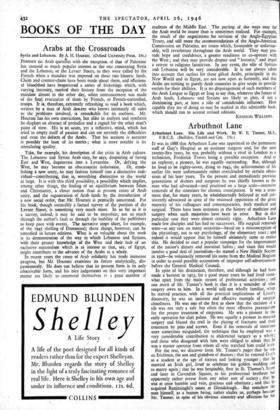BOOKS OF THE DAY
Arabs at the Crossroads
Syria and Lebanon. By A. H. Hourani. (Oxford University Press. 18s.)
PERHAPS no Arab questtn with the exception of that of Palestine has aroused so much popular interest as the one concerning Syria and the Lebanon, or the Levan-. States, as they were called by the French when a mandate was imposed on those two historic lands. Claim and counter-claim have been made about them, and effusions of bloodshed have bespattered a series of bickerings which, with varying intensity, marked their history from the inception of the mandate almost to the other day, when announcement was made of the final evacuation of them by French, or French-controlled, troops. It is, therefore, extremely refreshing to read a book which, written by a man of Arab descent who knows intimately all sides to the problems involved, is remarkable for its coolness. Mr. Hourani has his own convictions, but alike in analysis and synthesis he displays an absence of prejudice and a regard for the other man's point of view. His is an acute, yet a reflective, mind, which has tried to empty itself of passion and can sec serenely the difficulties and even the defects of the Arabs. That his account is accurate is possibly the least of its merits; what is more notable is its stimulating quality.
Take, for example, his description of the crisis in Arab culture. The Lebanese and Syrian Arab may, he says, despairing of fusing East and West, degenerate into a Levantine. Or, defying the
West, he may become an obscurantist isolationist. Or, estab- lishing a new unity, he may fashion himself into a distinctive indi- vidual—contributing, that is, something distinctive to the world at large. It is with this third possibility, a possibility which implies, among other things, the finding of an equilibrium between Islam and Christianity, a closer notion than at present exists of Arab unity, and the regeneration of Arab lands by the introduction of a new social order, that Mr. Hourani is primarily concerned. For his book, though ostensibly a factual survey of the position of the Levant States, is something very much more. In so far as it is a survey, indeed, it may be said to be imperfect, not so much through the author's fault as through the inability of the publishers to keep pace with events. The narrative stops short, for example, of the 1945 shelling of Damascus); these things, however, can be remedied in future editions. What is so valuable about the work is its demonstration of the way in which Lebanese and Syrians, with their greater knowledge of the West and their lack of an exclusive nationalism which is as intense as that, say, of Egypt, might contribute to the advance of the Arabs as a whole.
In recent years the cause of Arab solidarity has made immense progress, but Mr. Hourani examines its future analytically, dis- passionately. He does not believe that its present form is its only conceivable form, and his nice judgements on this very important matter are likely to commend themselves to a great number of
students of the Middle East. The parting of the ways may for the Arab world be nearer than is sometimes realised. For example, the result of the negotiations for revision of the Anglo-Egyptian Treaty, and still more the recommendations of the Anglo-American Commission on Palestine, are issues which, favourable or unfavour- able, will reverberate throughout the Arab world. They may pro- vide hope and confidence, a greater readiness to co-operate with the West ; and they may provide despair and " lostness," and impel a retreat to religious fanaticism. In any event, the role of Syrians and Lebanese will be very considerable. It is not always taken into account that outlets for these gifted Arabs, principally in the New World and in Egypt, are not now open as formerly, and that Arabs are turning to purely Arab countries to give scope to provide outlets for their abilities. It is no disparagement of such members of the Arab League as Egypt or Iraq to say that, whatever the future of Arab lands, Lebanese and Syrians are likely to play, if not a dominating part, at least a role of considerable influence. How capable they are of doing so may be studied in this admirable book. which should run to several revised editions.
KENNETH WILLIAMS.


























 Previous page
Previous page